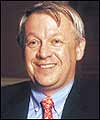|
Well now home entertainment
was my baby's wish/so i hopped into town for a satellite dish/I
tied it to the top of my Japanese car/I came home and I pointed
it out into the stars/A message came back from the great beyond/There's
57 channels and nothing on.
Bruce Springsteen, 57 Channels
(And Nothing On)
If
you agree with springsteen-that's there's nothing on-perhaps Carl
Meyer would like to change your mind. The managing director of The
History Channel, who was in Mumbai last fortnight to attend Frames
2002 (FICCI's Global Convention on the Business of Entertainment),
is in hectic negotiations to beam the channel into Indian homes
by the year-end. The History Channel will begin by using content
from its global library and, once it finds a foothold, it will consider
local production.
Meantime, evaluating an entry into the Indian
market is Techtv, a US channel that claims to be the only 24-hour
broadcaster of technology-related programming. ''If we do launch
operations, it won't be the same channel as in the US, but a different
name,'' says Rasa Urmonas, Head (Sales and Marketing), Asia, Techtv,
which beams into 30 million households in the US. Now, we aren't
sure whether Springsteen and his baby receive it too.
-Brian Carvalho
CHASM
The Great Divide
White collar salaries
continue to grow faster than blue collar ones.
White
collar, good; blue collar, bad. That's the message some numbers
just in from India Inc seem to be sending out. In 2001-02, average
white collar (WC) salaries rose 13-14 per cent. The corresponding
rise in blue collar (BC) salaries was 5-7 per cent. Shailesh Shah,
Managing Director, Watson Wyatt, says the gap will widen. Watson
Wyatt estimates that the difference between WC and BC salaries has
risen five- to ten-fold in three years. One reason is that companies
don't mind paying more for workers perceived to be adding value.
Alcatel India's Co-Chairman Sushil Baveja reckons that in telecom,
wc salaries rose 25 per cent last year, while BC ones did just 10
per cent. Some workers, it turns out, are more equal than others.
-Abha Bakaya
DISCOVERY COMMUNICATIONS
An All-New Discovery
It's now not just about animals and nature,
but about people too.
 |
| Discovery's Shourie: reinventing |
Appointment
viewing, not accidental. In TV jargon, that's the new mantra at
the six-and-a-half year old (in India) Discovery Channel, as it
launches an effort to appeal to a wider audience. That in turn,
the channel hopes, will help it become more attractive to advertisers.
So, much like mass-appeal channels like Sony,
Zee, and Star Plus, Discovery has adopted a programme schedule to
suit various audience segments: the 12 noon to 1 pm Woman's Hour
every weekday; the teen-specific ActionZone between 4 and 5 in the
afternoon; and the adult-oriented Late Night Discovery every weeknight
after 11, featuring everything from holiday spots to some intimate
stuff.
''It's limiting to be seen as a nature/wildlife
content channel. We're becoming a mainline unique content channel,''
says Deepak Shourie, MD, Discovery Communications India. About time
too: advertisers largely prefer mainstream entertainment channels,
and the bulk of the money that goes to other kinds of channels ends
up with news and sports channels. The question is whether the advertiser
will discover all this anytime soon.
-Shailesh
Dobhal
 |
| Intel's Claude M. Leglise: Strategic
intent, not opportunism |
INTEL
CAPTIAL
Inside The Low Profile World Of Intel Capital
Here's what the investment arm of the world's
largest chip-maker has been doing in India since 1998.
Thirty-two.
that's the number of investments made by Intel Capital in India,
making it one of the country's largest venture capital firms. Since
October 1998, the VC has invested in companies ranging from optical
networking hothouse Tejas to software services player R Systems
to dotcoms Rediff and Sharekhan. ''We invest with strategic intent,''
says Claude
M. Leglise, Vice President of Intel Capital.
''We want to stimulate growth in the internet, computing, and communications.''
Leglise says the strategy has helped the VC achieve, ''a higher
success rate, since less than 10 per cent of our investments don't
pay off.'' What about the Indian investments? ''We've been here
only three years,'' protests Leglise. Touche.
-Venkatesha Babu
BARISTA
TAKES ON THE WORLD
The born-in-India coffee chain unveils its
global aspirations.
 |
| Ravi Deol's: Grabbing a global opportunity |
There's
an apocryphal story doing the rounds about how Barista's promoter
Amit Judge of the Turner Morrison Group latched on to the idea of
a coffee chain after reading a book on Starbucks. Maybe that can
explain the chain's decision to go global. ''Global opportunities
like this do not wait,'' explains Managing Director Ravi Deol, when
questioned about the wisdom of trying to go global and increase
the number of domestic outlets from 80 to 200 in the same year.
Deol believes the main challenge in the Indian context isn't creating
the brand or standardising processes, but scaling up. ''Barista
in India is in the auto-pilot stage,'' agrees Sanjay Jain, Associate
Director (Strategic Advisory, M&A), Rabo Bank. Deol himself
will be in charge of the global offensive-former Leverite Yogesh
Samat has been roped in to head the domestic business-and says the
chain has identified four countries in Europe and South Asia that
it will enter over the next two years. The first 'international'
Barista store will open in Europe this September. Barista may be
India's biggest coffee chain-its turnover is expected to touch the
Rs 100-crore mark in 2002-03-but it is likely to find Europe, notwithstanding
its proposed investment of $5 million (Rs 25 crore), a different
cup of tea.
-Seema Shukla
|

